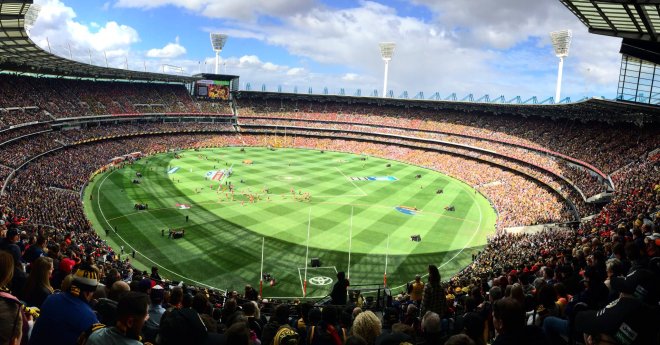
Introduction
Richmond Tigers have won the 2017 AFL Grand Final. They defeated Adelaide by forty-eight points.
Two days ago, I used median scoring profiles to suggest, all other things being equal, an Adelaide win. My season’s data for the competition gave me these end of quarter scores:

In my post, I suggested that the challenges to an Adelaide victory were:
- The closeness of the contest in the first quarter of the game
- Whether Richmond stayed with Adelaide in the 2Q
- If Richmond lifted in 3Q
Should Richmond mange these three conditions, I thought this would mean it would come down to which team had the legs and tactical nous in 4Q.
The scores by quarter were:

Richmond turned an 11 point deficit at the end of the first quarter into a nine point lead at half time. The end of the first quarter was the high water mark for Adelaide in the Final. Richmond outscored Adelaide in the second quarter by 20 points, lifted in the third quarter to outscore Adelaide by 25 points, and had the legs in the final quarter to outscore Adelaide by 14 points.
The Dog in the Night-Time
My all-things-being-equal-model indicated an Adelaide win. I was mindful that Richmond’s opportunities to own the game required some conditions to be met. I identified these conditions using median scoring profiles for each quarter of games played over the whole season for both teams.
The result of the game sent me back to a paper written by George Lewis and Jonathan Lewis in 1980, The Dog in the Night-Time: Negative Evidence in Social Research. They proposed:
In social research, there is an overwhelming emphasis upon collecting positive data, whether it be in the form of statistically significant attitudes, important documents, or observer descriptions of unique settings. This emphasis, while responsible for shedding much light in previously dark areas, none the less has had the important and dangerous side-effect of minimizing the worth of negative evidence, that is, the significance of a thing’s absence. (1980:544)
Their paper suggests a paradigm of seven types of negative evidence:
(1) Events Do Not Occur; (2) Population Is Not Aware of Events; (3)Population Wishes to Hide Events; (4) Commonplace Events Are Overlooked; (5) Effects of the Researcher’s Idea Set; (6) Unconscious Non-Reportage; and (7) Conscious Non-Reportage. (1980:544)
They conclude with the observation “in order to gain the best perspective on the problems one is studying, there must be a greater emphasis on uncoverlng and utlilzlng negatlve evidence” (1980:555).
Moments
This post is my way of responding to negative evidence and is an exploration of the phenomenographic reporting of the game. I did not watch the game but monitored the score on the AFL web site.
Moments in the Grand Final for me were:
#AFLGF Richmond met one of conditions for upset – competitive second quarter. Richmond 2Q 8pts better than season median. Adelaide 25 worse
— Keith Lyons (@520507) September 30, 2017
#AFLGF third condition for upset met. Richmond lifted in 3Q 13 points better than season median. Adelaide 16 points worse than season median
— Keith Lyons (@520507) September 30, 2017
Post game I looked at the official AFL match feed and picked out these moments:



This led me to think about the conversations both coaches would have had with their respective teams at half time. I felt that a nine point half-time difference would make the third quarter of the game a fascinating contest of wills and dynamical tactical responses.


Note the word ‘obliterated’ in this Q3 summary.


The outcome of these moments was Richmond’s first championship in 37 years. Now that this game is in the data base we have an opportunity to contemplate how the Final might have been played differently.
Moving from If …Then to Yes … And
I confess to not going out in my back yard to replay the moments of the Grand Final. I did imagine how these games might be played out in yards in Richmond and Adelaide.
What the negative evidence of this Grand Final has encouraged me to think about is how we might structure learning environments. I am more and more convinced that if we were to move away from prescriptive IF … THEN plans to a much more improvised YES … AND encouragement, we might be able to be even more responsive to changes in game state and tactical dispositions.
YES … AND accepts negative (and positive) behaviours and dampens (or amplifies) them. In my data terms, this would enable teams to be true to type in any game context … even with the aura of playing in a Grand Final.

Photo Credits
We’ve done it (Richmond FC, Twitter)
Well that was fun (Caitlin Arnold, Twitter)






